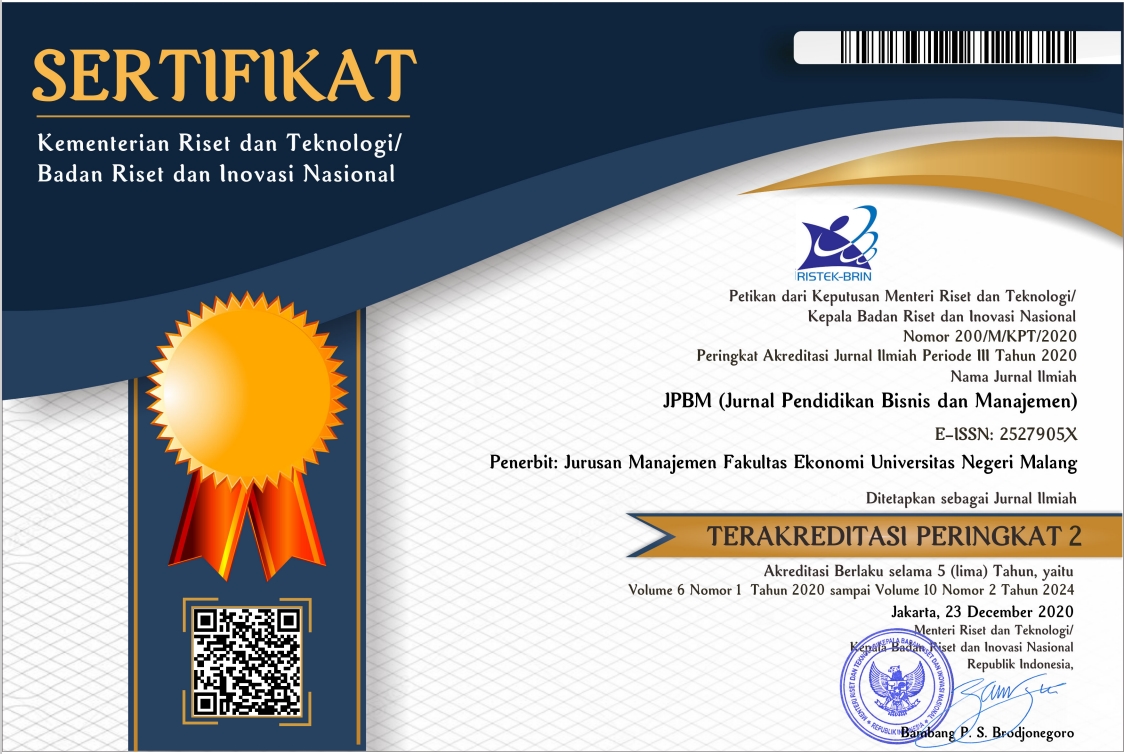Social Capital, Entrepreneurial Leadership and SMEs Performance: The Mediating Effect of Innovation Capability
Abstract
This study aims to solve the problems of SMEs’ performance in the culinary and hospitality sectors in Pekanbaru by involving several companies’ internal environmental factors to build a competitive strategy. The variables engaged in this study consisted of social capital, entrepreneurial leadership, innovation capability, and performance. It involves 200 SMEs consisting of 167 culinary enterprises and 33 hospitality enterprises in Pekanbaru City in Riau of Indonesia. Using the structural equation model (SEM) approach, the results show that social capital has no significant direct effect on the business performance of culinary and hospitality SMEs in Pekanbaru. However, social capital indirectly affects SMEs’ performance through innovation capability. In addition, entrepreneurial leadership, directly and indirectly, affects the financial and non-financial performance of SMEs through capability. Culinary and hospitality SMEs in Pekanbaru must do a job in relationships partnerships with withs with common goals in furthering SMEs business. This active participation helps SMEs nurture knowledge and the latest information in the business world. Furthermore, culinary and hospitality SMEs actors were dominated by young entrepreneurs. It could be a valuable capital for SME act to be more innovative and creative in company improvement strategies, especially in coping with the COVID-19 pandemic.
Keywords: Social capital, Entrepreneurial leadership, Innovation capability, SMEs performance
Keywords
Full Text:
PDFReferences
Aini, E. K, David., S. L. C., Al-Musadieq, M., & Handayani, R. S. (2013). The role of innovation capability on business performance of small and medium enterprises. Journal of Profit, 7(1), 102–12.
Ansari, S., Munir, K., & Gregg, T. (2012). Impact at the ‘bottom of the pyramid’: The role of social capital in capability development and community empowerment. Journal of Management Studies, 49(4), 813-842.
BPS. (2020). Statistik Indonesia 2020. Retrieved from https://www.bps.go.id/
Chamsuk, W., Wanno, F., & Takala, J. (2017). The effects of R&D and Innovation capabilities on the Thai automotive industry part’s competitive advantage: A SEM Approach. Management and Production Engineering Review, 8(1), 101–12.
Claridge, T. (2004). Social capital and natural resource management. Unpublished Thesis, University of Queensland, Brisbane, Australia.
Filippetti, A., & Archibugi, D. (2011). Innovation in times of crisis: National systems of Innovation, structure, and demand. Research policy, 40(2), 179-192.
Ghozali, I. (2017). Model persamaan struktural, konsep dan aplikasi dengan program AMOS 24. Semarang: Badan Penerbit Universitas Diponegoro.
Greef, A. M. (2014). Entrepreneurial leadership and its effect on the social performance of the organisation (Bachelor's thesis, University of Twente).
Gupta, V., MacMillan, I. C., & Surie, G. (2004). Entrepreneurial leadership: developing and measuring a cross-cultural construct. Journal of Business Venturing, 19(2), 241-260.
Hair, J. F., Sarstedt, M., Ringle, C. M., & Mena, J. A. (2012). An assessment of the use of partial least squares structural equation modeling in marketing research. Journal of the Academy of Marketing Science, 40(3), 414-433.
Hudson, M., Lean, J., & Smart, P. A. (2001). Improving control through effective performance measurement in SMEs. Production Planning & Control, 12(8), 804-813.
Hunt, S. D., & Morgan, R. M. (1997). Resource-advantage theory: a snake swallowing its tail or a general theory of competition?. Journal of Marketing, 61(4), 74-82.
Jagdale, D., & Bhola, S. S. (2014). Entrepreneurial leadership and organizational performance with reference to rural small scale engineering industry in Pune district. Golden Research Thoughts, 4(2), 1–9.
Lateh, M., Hussain, M. D., & Abdullah, M. A. (2018). Social entrepreneurship development and poverty alleviation - A literature review. MAYFEB Journal of Business and Management, 2, 1–11.
Lawson, B., & Samson, D. (2001). Developing innovation capability in organisations: a dynamic capabilities approach. International journal of innovation management, 5(03), 377-400.
Meflinda, A., Mahyarni, M., Indrayani, H., & Wulandari, H. (2018). The effect of social capital and knowledge sharing to the small medium enterprise's performance and sustainability strategies. International Journal of Law and Management, 60(4),988–97.
Mgeni, T. O. (2015). Impact of entrepreneurial leadership style on business performance of SMEs in Tanzania. Journal of Entrepreneurship & Organization Management, 4(2), 1–9.
Mokhber, M., Vakilbashi, A., Zamil, N. A. M., & Basiruddin, R. (2016). Impact of entrepreneurial leadership on organization demand for innovation: Moderating role of employees’ innovative self-efficacy. International Review of Management and Marketing, 6(3), 415-421.
Nahapiet, J., & Ghoshal, S. (1998). Social capital, intellectual capital, and the organizational advantage. Academy of management review, 23(2), 242-266.
Oliveira, J. (2013). The influence of the social capital on business performance: an analysis in the context of horizontal business networks. Revista de Administração Mackenzie, 14(3), 209–35.
Ozigi, O. (2018). Social capital and financial performance of small and medium scale enterprises. Journal of Advanced Research in Business and Management Studies, 10(1), 18-27.
Putri, R. A. (2018). Leadership style and interpersonal communication of employee satisfaction and it’s effect on the employee performance. JPBM (Jurnal Pendidikan Bisnis dan Manajemen), 4(3), 101-106.
Rajapathirana, R. J., & Hui, Y. (2018). Relationship between innovation capability, innovation type, and firm performance. Journal of Innovation & Knowledge, 3(1), 44-55.
Renko, M., El Tarabishy, A., Carsrud, A. L., & Brännback, M. (2015). Understanding and measuring entrepreneurial leadership style. Journal of small business Management, 53(1), 54-74.
Romijn, H., & Albaladejo, M. (2000). Determinants of innovation capability in small UK firms: an empirical analysis. Eindhoven Centre for Innovation Studies Working Paper.
Saunila, M., Pekkola, S., & Ukko, J. (2014). The relationship between innovation capability and performance: The moderating effect of measurement. International Journal of Productivity and Performance Management, 63(2), 234–49.
Sugiyanto, E. K., & Marka, M. M. (2017). Modal sosial dan human capital sebagai alat untuk meningkatkan kinerja pemasaran. Jurnal Manajemen dan Kewirausahaan, 5(2), 36-42.
Surie, G., & Ashley, A. (2008). Integrating pragmatism and ethics in entrepreneurial leadership for sustainable value creation. Journal of Business Ethics, 81(1), 235-246.
Teece, D. J., Gary, P., & Amy, S. (2009). Dynamic capabilities and strategic management. Knowledge and Strategy, 18, 77–116.
Tjahjadi, B., Soewarno, N., Astri, E., & Hariyati, H. (2019). Does intellectual capital matter in performance management system-organizational performance relationship? Experience of higher education institutions in Indonesia. Journal of intellectual capital, 20(4), 533–54.
Vosta, L. N., & Jalilvand, M. R. (2014). Examining the influence of social capital on rural women entrepreneurship: An empirical study in Iran. World Journal of Entrepreneurship, Management and Sustainable Development, 10(3), 209–27.
Wang, Z., & Wang, N. (2012). Knowledge sharing, innovation and firm performance. Expert systems with applications, 39(10), 8899-8908.
Van Zyl, H. J., & Mathur-Helm, B. (2007). Exploring a conceptual model, based on the combined effects of entrepreneurial leadership, market orientation and relationship marketing orientation on South Africa's small tourism business performance. South African journal of business management, 38(2), 17-24.
Refbacks
- There are currently no refbacks.
JPBM (Jurnal Pendidikan dan Bisnis Manajemen) is licensed under a Creative Commons Attribution-NonCommercial-ShareAlike 4.0 International License.
JPBM (Jurnal Pendidikan dan Bisnis Manajemen) is abstracted and indexed in :
















